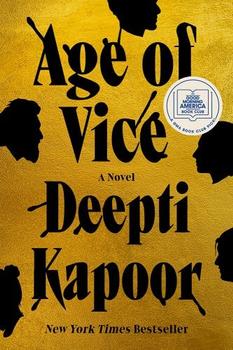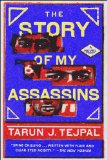Summary | Excerpt | Reading Guide | Reviews | Beyond the book | Read-Alikes | Genres & Themes | Author Bio

Critics' Opinion:
Readers' Opinion:
First Published:
Jan 2007, 928 pages
Paperback:
Jan 2008, 928 pages
 Book Reviewed by:
Book Reviewed by:
BookBrowse Review Team
Buy This Book
Chandra says that he set out to write a
conventional thriller, "You know, the type of thing that starts
with a dead body on the first page and then at the most 300
pages later ends up with everything figured out and fixed,"
However, as he started to research the novel by spending time
with Indian policemen, crime reporters and gangsters, he
realized that what seemed like a local crime "had all these
connections to politics and religion and the ongoing struggles
between nation-states in the region".
In short, Chandra got a sense of "this huge web of events,
people, organizations and forces at work that were affecting
people's lives and linking them together." and at some point he
realized "damn, this is going to be big!"
Seven years later and 928 pages in length (in the English
version, the Hindi version is 1200 pages!) it certainly is big.
Harper Collins had sufficient confidence in it to lay down $1
million to win the bidding war for USA publishing rights
(following similar bidding wars in the UK and India).
Some reviewers love it, some are a little muted, a few downright
hate it. Will it be for you? That depends. Like a python with
weight-control issues, it seems that Chandra has swallowed
everything in his path in an attempt to encompass the very
essence of modern India, most specifically the racial and ethnic
conflicts that have repeatedly threatened the country in the
almost 60 years since independence.
"[T]hings that happened 50 years ago in a sense wrote
divisions physically into the geography of the region, but also
into people's bodies and minds. Those events continue to have
very clear impacts on our lives today. And I wanted to get at
least the feeling of that and not shy away from its ugliness.
The propensity for violence that coexists with all those other
feelings was something I wanted to deal with."
At the heart of this tale is a detective yarn centered on
Inspector Sartaj Sing (previously seen in Love and Longing in
Bombay), a middle-aged divorcee with a stagnant career and
love-life. He's a good detective but no angel, as is shown early
on. Around this central thread Chandra weaves at least a
half-dozen sub-plots, and throws in a number of effectively
unrelated stories to boot. The result is a sometimes brutally
violent epic set in the jangling heart of Bombay in all its
confused variety that some feel would have been a better book at
around 600 pages.
It is interesting to note that at least one reviewer who
criticizes the length of Sacred Games opens his review by
stating that he is an admirer of long Indian novels such as
Vikram Seth's A Suitable Boy and Salman Rushdie's
Midnight's Children. In other words it's not so much the
length that some take issue with but the structure. For example,
one reviewer comments that it is not good for the flow of the
story to have one's main protagonist off stage for 100 pages at
a time! A number of others complain about the four chapters
totaling 130 pages, labeled "Insets", which provide back stories
to peripheral characters but are otherwise unrelated to the main
flow.
One of Chandra's techniques that does draw praise is his habit
of using many local words in the text in such a way that the
meaning can be inferred, without the need to fall back on
glossaries, footnotes, or even italics. As one reviewer puts it
"Chandra refuses to serve Bombay up on a plate to outsiders. The
reader must sink or swim - no water wings are provided."
So, back to the central question, is this a book for you? Will
you feel like the reviewer for The Washington Post who
felt it was a " massive dead weight of a novel" or will you side
with the Booklist reviewer who gave it a starred review
describing it as "a splendidly big, finely made book destined to
dazzle a big audience"?
Most likely you'll end up giving it the caveatted respect that
most reviewers have, summed up by the reviewer for the UK
newspaper, The Observer, who concludes, "Will Chandra be
able to etch into this second-hand template all the magical
dirty details of the city? As the book goes on, the answer more
and more seems to be 'yes', but Chandra could have made it
easier on himself, not to mention the reader."
Incidentally, towards the end of the '90s, a huge scandal
hit Mumbai which slowly unfolded to reveal a web of corrupt
relationships involving organized crime and the movie dream
factory of Bollywood, reminiscent of Chicago during the gangster
glory days of prohibition. Violence, intimidation,
money-laundering and corruption were the norm and gangster
bosses were local media celebrities. This background is worth
knowing because some of Chandra's more improbable plot twists
did happen in real life!
Sikhs
Chandra's lead protagonist is a Sikh. There are about 23
million Sikhs worldwide, of which about 60% live in Punjab in
the North of India, where they form the majority. The Punjab is
known as India's breadbasket and enjoys one of the most
industrialized economies in the nation. Sikhs are spread across
India but overall form less than 2% of the population. Nine out
of ten Sikhs live in India but there are also significant
communities spread worldwide, particularly in English speaking
countries, most notably the UK and Canada.
Sikhs believe in one God and respect the teaching of the ten
Gurus. The term Sikh originates from the Sanskrit for disciple
or follower. The basic tenants of their religion (founded more
than 500 years ago) require them to live an honest life without
discrimination.
Devout Sikhs always wear five items as an external symbol of
their faith: The hair is uncut (Kesh) and contained
inside a turban; they carry a wooden comb to comb their hair
twice a day (Kanga) which is usually stored inside the
turban where it serves the double purpose of holding the hair in
place; they wear an iron bracelet (Kacha); and a strapped
knife (Kirpan) which symbolizes that a baptized Sikh is
both a saint and a soldier. Lastly they wear an almost
knee-length undergarment made out of a white, light-weight
cotton material securely tied with a drawstring (Kachar);which
reminds Sikhs to refrain from lust, one of the Five Evils to be
avoided; the others being anger, greed, worldliness and pride.
![]() This review was originally published in The BookBrowse Review in January 2007, and has been updated for the
January 2008 edition.
Click here to go to this issue.
This review was originally published in The BookBrowse Review in January 2007, and has been updated for the
January 2008 edition.
Click here to go to this issue.

If you liked Sacred Games, try these:

by Deepti Kapoor
Published 2024
This is the age of vice, where money, pleasure, and power are everything, and the family ties that bind can also kill.

by Tarun J. Tejpal
Published 2013
Part thriller and part erotic romance, full of dark humor and knife-edged suspense, The Story of My Assassins is an awesome adventure into the heart of today's India.





The House on Biscayne Bay
by Chanel Cleeton
As death stalks a gothic mansion in Miami, the lives of two women intertwine as the past and present collide.

The Flower Sisters
by Michelle Collins Anderson
From the new Fannie Flagg of the Ozarks, a richly-woven story of family, forgiveness, and reinvention.

The Funeral Cryer by Wenyan Lu
Debut novelist Wenyan Lu brings us this witty yet profound story about one woman's midlife reawakening in contemporary rural China.
Your guide toexceptional books
BookBrowse seeks out and recommends the best in contemporary fiction and nonfiction—books that not only engage and entertain but also deepen our understanding of ourselves and the world around us.